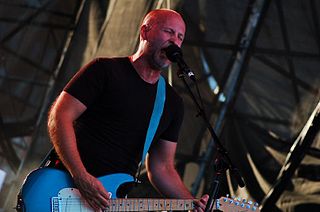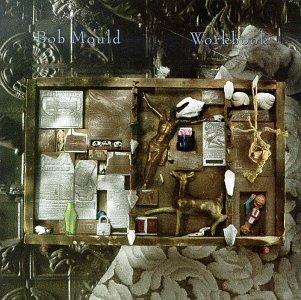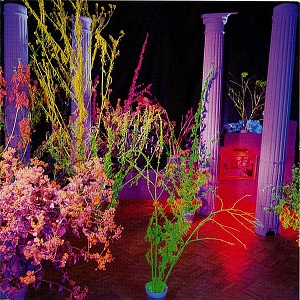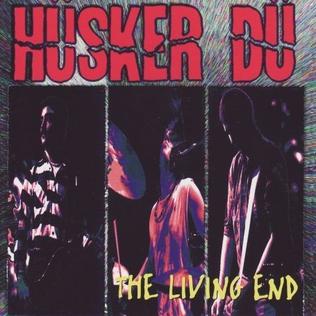
Nirvana was an American rock band formed in Aberdeen, Washington, in 1987. Founded by lead singer and guitarist Kurt Cobain and bassist Krist Novoselic, the band went through a succession of drummers, most notably Chad Channing, before recruiting Dave Grohl in 1990. Nirvana's success popularized alternative rock, and they were often referenced as the figurehead band of Generation X. Despite a short mainstream career spanning only three years, their music maintains a popular following and continues to influence modern rock culture.

Grunge is an alternative rock genre and subculture which emerged during the mid-1980s in the U.S. state of Washington, particularly in Seattle and nearby towns. Grunge fuses elements of punk rock and heavy metal. The genre featured the distorted electric guitar sound used in both genres, although some bands performed with more emphasis on one or the other. Like these genres, grunge typically uses electric guitar, bass guitar, drums and vocals. Grunge also incorporates influences from indie rock bands such as Sonic Youth. Lyrics are typically angst-filled and introspective, often addressing themes such as social alienation, self-doubt, abuse, neglect, betrayal, social and emotional isolation, addiction, psychological trauma and a desire for freedom.
Alternative rock is a category of rock music that evolved from the independent music underground of the 1970s. Alternative rock acts achieved mainstream success in the 1990s with the likes of the grunge subgenre in the United States, and the Britpop and shoegaze subgenres in the United Kingdom and Ireland. During this period, many record labels were looking for "alternatives", as many corporate rock, hard rock, and glam metal acts from the 1980s were beginning to grow stale throughout the music industry. The emergence of Generation X as a cultural force in the 1990s also contributed greatly to the rise of alternative music.

Mission of Burma was an American post-punk band from Boston, Massachusetts. The group formed in 1979 with Roger Miller on guitar, Clint Conley on bass, Peter Prescott on drums, and Martin Swope contributing audiotape manipulation and acting as the band’s sound engineer. In this initial lineup, Miller, Conley, and Prescott all shared singing and songwriting duties.

Zen Arcade is the second studio album by American punk rock band Hüsker Dü, released in July 1984 on SST Records. Originally released as a double album on two vinyl LPs, Zen Arcade tells the story of a young boy who runs away from an unfulfilling home life, only to find the world outside is even worse. Zen Arcade and subsequent Hüsker Dü albums were instrumental in the creation of the alternative rock genre, and it is considered by some to be one of the greatest rock albums of all time.

Robert Arthur Mould is an American musician, principally known for his work as guitarist, vocalist, and songwriter for alternative rock bands Hüsker Dü in the 1980s and Sugar in the 1990s.
Sugar was an American alternative rock band active in the early 1990s. Formed in 1992, they were led by the singer and guitarist Bob Mould, alongside bassist David Barbe (ex-Mercyland) and drummer Malcolm Travis.

New Day Rising is the third studio album by the American punk rock band Hüsker Dü. It was released in 1985 through SST Records.

Hüsker Dü was an American punk rock band formed in Saint Paul, Minnesota in 1979. The band's continuous members were guitarist/vocalist Bob Mould, bassist Greg Norton, and drummer/vocalist Grant Hart. They first gained notability as a hardcore punk band, and later crossed over into alternative rock. Mould and Hart were the band's principal songwriters, with Hart's higher-pitched vocals and Mould's baritone taking the lead in alternating songs.

Workbook is the 1989 debut solo album by American guitarist and singer Bob Mould, following the breakup of the influential punk rock band Hüsker Dü. The album has a strong folk influence and lighter overall sound than he had been known for, although heavy guitar features occasionally. Drummer Anton Fier and bassist Tony Maimone, both of Pere Ubu fame, served as Mould's rhythm section on the album and on the subsequent live shows. The single "See a Little Light" was a hit on the US Modern Rock chart.

Warehouse: Songs and Stories is the sixth and final studio album by American punk rock band Hüsker Dü, released by Warner Bros. Records on January 19, 1987, as a double album on two vinyl LPs.

Flip Your Wig is the fourth studio album by American punk rock band Hüsker Dü, released in September 1985 through SST Records. It was the band's best-selling album to that point for their label SST Records, and was the last they made for that label.

Grant Vernon Hart was an American musician, best known as the drummer for the punk rock band Hüsker Dü. After the band's breakup in 1988, he released his first solo album, Intolerance, before forming the alternative rock trio Nova Mob, where he moved to vocals and guitar. His solo career became his main focus after the dissolution of Nova Mob in 1997.

Body of Song is the sixth solo album from punk/indie/alternative rock veteran Bob Mould. It is his first studio album under his own name since 2002's controversial Modulate.
Granary Music is the independent record label and publishing company operated by Alternative/punk/indie icon Bob Mould, formerly of Hüsker Dü and Sugar.

File Under: Easy Listening is the second and final studio album by Sugar.

Michael Azerrad is an American author, music journalist, editor, and musician. A graduate of Columbia University, he has written for publications such as Spin, Rolling Stone, and The New York Times. Azerrad's 1993 biography Come as You Are: The Story of Nirvana was named by Q as one of the 50 greatest rock books ever written. His 2001 book Our Band Could Be Your Life, a collection of profiles on prominent indie rock bands, received similar critical acclaim.

The Living End is a live album and final release by American punk rock band Hüsker Dü, released on April 7, 1994, by Warner Bros. Records. It was recorded at various venues throughout October 1987, but was not released until 1994.

Bob Mould is the third solo album by former Hüsker Dü and Sugar guitarist and singer Bob Mould. It was recorded and mixed between September & November 1995 and released in April 1996. Mould played all of the instruments on the album himself, and the sleeve notes declare, "This one is for me." In the place of traditional band credits, the sleeve states, "Bob Mould is Bob Mould."

Beaster is a 1993 mini-album by Sugar. Its songs were recorded at the same time as the band's acclaimed first album, Copper Blue. However, Beaster has a much denser, heavier sound, closer in spirit to frontman Bob Mould's earlier band Hüsker Dü than to Copper Blue. "Lyrically it's so unnerving for me to listen to it…" said Mould. "Musically it's harder, it's a little looser. Lyrically, it's a lot wilder than Copper Blue… Copper Blue was such a great pop record that I just saw this as like the evil twin."
















